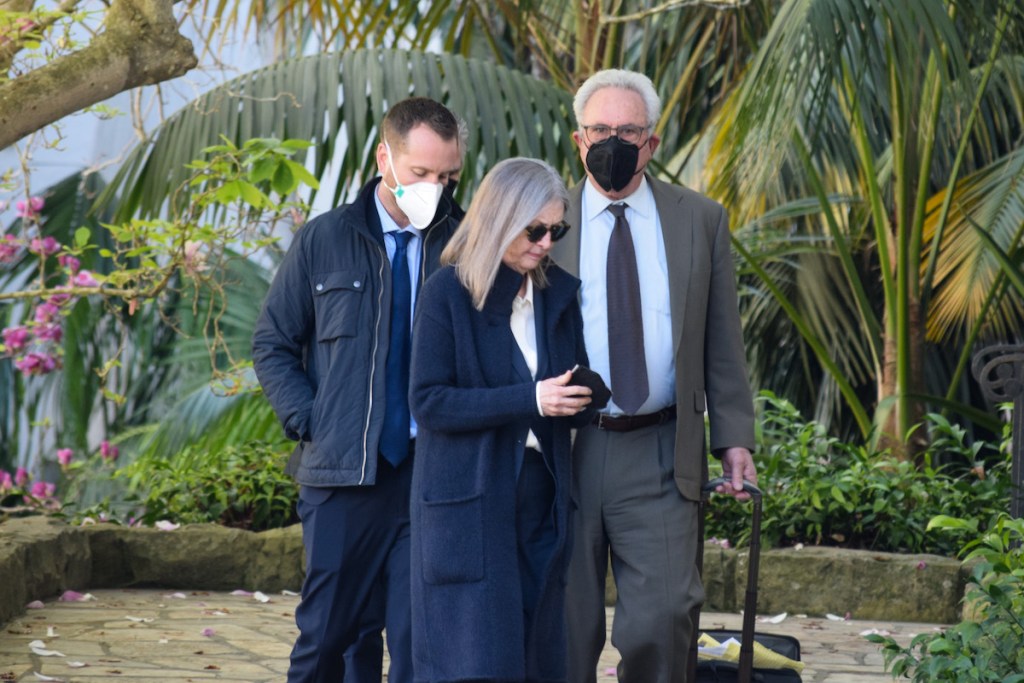Prosecutor Maggie Charles called on two members of CONREP — the conditional release program that acts as an outpatient arm of the state hospital for those who are transitioning to life in the community — to dive into the progress of David Attias, who is currently petitioning to legally restore his sanity and effectively be completely free from the terms of his release.
Lisa Bendimez worked as a forensic psychologist for the Ventura County conditional release program and had weekly therapy sessions with Attias for more than four years. During her testimony in Judge Thomas Adams’s courtroom Tuesday, she described the structure built around Attias through the program, which has four levels of supervision varying from “intensive” to “transitional” and eventually aftercare — which is the final step to a full release.
Attias was released from Patton State Hospital in 2012 — more than a decade after running his car through a busy Isla Vista street and ultimately killing five people in 2001 — and has been in varying degrees of conditional release since then. He is currently in what is considered “supportive” care, which requires twice monthly check-ins with his psychiatrist, individual and group sessions, random drug tests, and at-home drop-in visits. Attias is also required to ask for permission to start any new relationships and provide two weeks’ advance notice to leave the area.
According to Bendimez, Attias has had several setbacks during their time working together, including an incident at his place of employment with a coworker that led to him being transferred to another store. During her sessions, she said he exhibited a “sense of entitlement” that prevented him from processing and addressing his core issues, one of which, she said, was dealing with rejection. “Rejection was a salient trigger in his history,” she said.
Sign up for Indy Today to receive fresh news from Independent.com, in your inbox, every morning.
She commended his effort in most areas of the program, saying he was often open and honest about his triggers and that he has shown growth in that time. But the incidents at work — and several other instances where he pushed back on his conditional release — have kept him ping-ponging between the intermediate and supportive care levels. He has yet to reach the “transitional” phase, which is the final step before aftercare and discharge from the program.
“The whole goal of the program is that they will be able to be on their own,” Bendimez said. By the time she arrived at CONREP, Attias was already more than five years into the program and still had trouble facing his reality. “He hadn’t really processed his crime and the impact it had on the victims and the family. He was afraid to process because of what it might do to him.”
She said the staff regularly made accommodations for Attias: He was allowed to go to raves and be out until 2 a.m., attend Lakers basketball games, and visit his parents out of town as long as he provided two weeks’ notice. On one occasion, when a bank turned him down for a job after a background check, he called the program’s crisis hotline, demanding a letter of recommendation from Bendimez. When she refused, he went to the program director. He later attempted to arrange a meeting in Los Angeles with a family friend who had connections with the bank but was denied leave because he didn’t provide the two weeks’ notice.
Attias’s attorney Jack Earley, argued that these setbacks, including his failure to disclose a sexual relationship with a married woman, were not enough to be considered manic episodes and seemed to imply that the staff of his conditional release program were vested in keeping him in their care.
Setareh Khan-Mohammadi, community program director at CONREP in Ventura County, took the stand at the end of the day and agreed with Bendimez that Attias has made progress but is not ready for unconditional release. She also denied that the program benefits in any way from keeping any client in their care. “There’s absolutely no financial incentive to keep a client,” she said.
Earley contended that since Attias’s diagnosed bipolar disorder is technically in remission, he is not in danger of becoming violent and should be granted release.
“That is not our recommendation,” Khan-Mohammadi said. “That’s not to say he’s not doing well, but there’s a systematic approach we use.” She said that though the setbacks may seem minor, they are subtle hints into a danger that could still be lurking inside. “We do not believe he is ready at this time.”
Court will resume on Wednesday with Khan-Mohammadi on the stand, followed by an opportunity for Attias to be recalled to testify before closing arguments.
Support the Santa Barbara Independent through a long-term or a single contribution.

